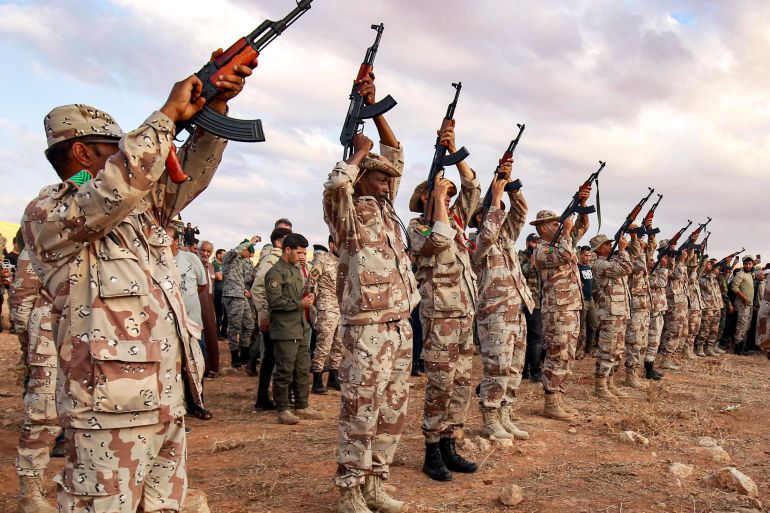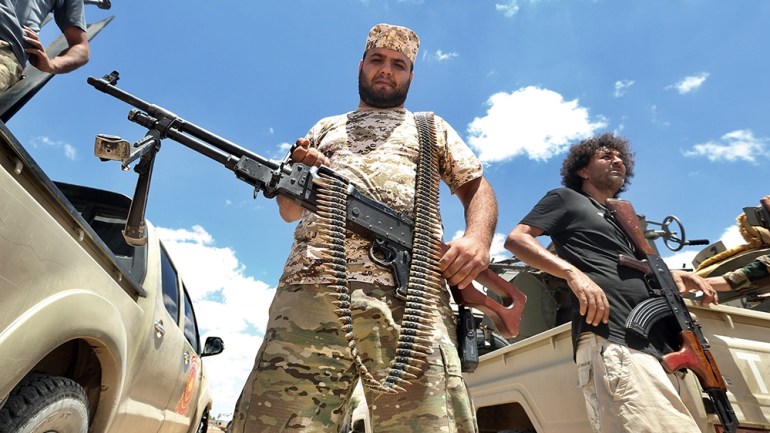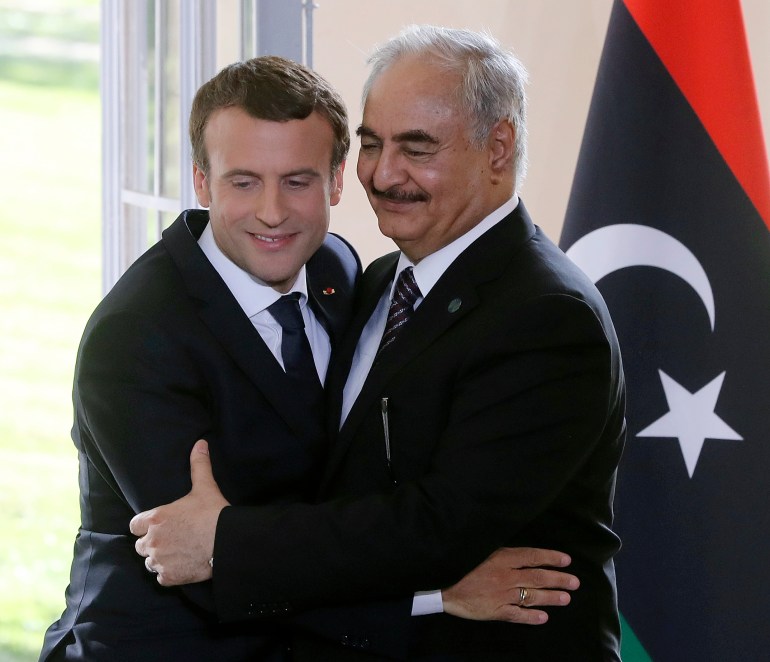Chairman of Libya’s High Council of State talks elections, Turkey
Khalid al-Mishri tells Al Jazeera holding a vote and ridding the country of foreign fighters are key for Libya’s ceasefire to continue.

The chairman of Libya’s High Council of State, Khalid al-Mishri, warns a fragile ceasefire in the war-ravaged North African country could come undone if elections are not held near the end of the year as planned.
“Unless we hold elections close to the date of December 24th, I’m afraid conflict will be back,” al-Mishri told Al Jazeera in an exclusive interview.
Keep reading
list of 4 itemsUN boss: Foreign fighters still in Libya in breach of ceasefire
TunisAir first foreign carrier to resume Libya flights
UN envoy: Libya mercenaries a threat to entire North Africa
Libya descended into civil war after a 2012 NATO intervention that overthrew the oil-rich country’s then dictator Muammar Gaddafi. The nation was split between the UN-recognised Government of National Accord (GNA) in the west based in Tripoli, and eastern militias led by military commander Khalifa Haftar.
Speaking about the risks that could derail elections, al-Mishri stated: “Security remains the biggest challenge and Haftar is the obstacle. We need to see sincere efforts by Western countries to convince Haftar to move away from threatening democracy.”
In 2019, Haftar launched an assault with eastern-based forces on the GNA. The conflict took the form of an international proxy war as outside powers competed for influence. Haftar received support from the United Arab Emirates (UAE), Egypt, Russia, and France, while Turkey backed the GNA.
Haftar’s assault on Tripoli and military campaign stalled after Ankara provided the Tripoli-based government with military equipment, Turkish troops, and Syrian mercenaries.
A ceasefire in October 2020 led to the formation of an interim government, and in March it was tasked with steering the country towards elections in December 2021.

‘No control’
The issue of foreign fighters has become a main point of contention as the country works to reunify and comes as the United Nations Special Envoy on Libya Jan Kubis recently said efforts at reopening Libya’s main coastal highway, linking the east and west of the country, have stalled.
Al-Mishri said the reopening is being prevented by the presence of foreign fighters. “We can’t afford to open the motorway with the presence of such forces.
“From our side there is no presence of any foreign soldiers 200km [90 miles] west of the highway and when we talk about foreign troops we mean Turkish soldiers. They are not there,” he stated.
Complicating matters, al-Mishri claimed that Haftar has limited control over the foreign fighters embedded around the key city of Sirte and the western part of the roadway, particularly Russian mercenaries from the Wagner Group.
“Haftar and his forces have no control over the Wagner group. They can’t do anything about it,” he said.
Libya’s new government says it is more appropriate to talk directly with Moscow. “We have tackled this issue with the Russians. I can’t say we have achieved a lot of progress but the issue is on the table,” he added.
According to UN estimates in December, at least 20,000 foreign fighters and mercenaries remain in the country including Syrians, Russians, Sudanese and Chadians.
Libya’s new Foreign Minister Najla al-Mangoush has come under fire recently from pro-Ankara camps in Libya for demanding the withdrawal of Turkish soldiers from the country along with other foreign fighters.
The High Council of State, which al-Mishri heads, is considered close to Turkey. He said the council supports Turkish troops leaving the country, but only when elections are conducted, stability returns, and the threat posed by Haftar is gone.
Asked about the foreign minister’s comments, al-Mishri stated: “[She] came to this position based on an agreement to allocate certain positions to individuals just to appease everyone. She wasn’t well acquainted with the position and Libya. She doesn’t know much about the complications on the ground.”
‘Loose foreign forces’
In December 2019, the UN-recognised government of Libya formally requested Turkish military assistance in the face of Haftar’s assault.
Turkish troops remain stationed throughout the country including at al-Watiya airbase for helicopter training and a naval base on the Mediterranean coastal city of Misrata.
Al-Mishri said the Turkish presence in Libya is not comparable to other foreign forces as “it is legal and clear. On the opposite side, we have loose foreign forces nobody controls, even Haftar.”
The status of Turkish troops in Libya comes as ties between Ankara and the country’s new Government of National Unity have been in focus following the visit of Prime Minister Abdul Hamid Dbeibeh to Ankara in April.
Ankara is eager to see infrastructure projects that were awarded to companies before the eruption of the civil war are kept in Turkish hands, a position Dbeibeh has committed to.
In addition to older initiatives, Turkish firms signed a raft of new agreements for construction projects, including the building of power plants, a shopping mall, and an airport terminal during Dbeibeh’s visit.
The Libyan leader also expressed his commitment to a contentious 2019 maritime agreement signed by the GNA and Ankara that Greece claims infringes on its sovereign rights.
“This agreement is for the benefit of the Libyan people,” al-Mishri said when asked about the deal, which Athens says is in violation of the UN Convention on the Law of the Sea.

Plenty of projects
While Turkey may enjoy stronger ties with the interim government, it is not the only country looking to carve out a role for itself in the oil-rich state’s reconstruction.
Companies from Libya’s old colonial power, Italy, are set to work on the expansion of a coastal highway to Tunisia. France, an early backer of Haftar, has reopened its embassy in Tripoli as it looks for a greater role in reconstruction.
“Turkey will have a preferable position,” al-Mishri said, “but the country is large and the economic projects are plenty. With the right government we can satisfy everyone.”
Libya’s largest neighbour, Egypt, is also looking to benefit. Before the conflict, Libya was an important destination for expatriate Egyptian workers. Cairo also has security interests with its neighbour.
Egypt was an early backer of Haftar and in June 2020, as his offensive against Tripoli crumbled, President Abdel Fattah el-Sisi threatened military intervention in Libya if the GNA pushed westward into the strategic city of Sirte.
Al-Mishri said since the formation of the new government relations have improved.
“Egypt was siding with the wrong side. They were looking for a strong ally to ensure security on their western border and were under the impression Haftar was that ally,” he reflected. “Recent communications have broken the ice and we now understand each other in a better way.”
‘Creating a new dictator’
He emphasised the importance of thawing tensions between Ankara and Cairo for the political process. “We realize once we have good Egyptian-Turkish relations, that will reflect positively on Libya,” al-Mishri said.
Although fighting has nearly ceased and progress at unifying state institutions is under way, Libya is still in an extremely fragile position. Arms continue to move into the country and politicians have been accused of delaying the government transition with the aim of preserving their power.
The High Council of State is calling for a referendum on a constitution before elections in December.
Some parties accuse the council, and its eastern counterpart the House of Representatives, of using the referendum as a means to delay the vote.
Al-Mishri said holding the referendum is critical. “If we hold elections without the referendum on the constitution and bring in a new president, then it would be similar to creating a new dictator.”
If a referendum is not held on time, one possibility he suggested is implementing a draft constitution – approved by the High Council of State and House of Representatives – that could be adapted for five years.
This summer will test if Libya can move forward on a political solution to its nearly 10-year-old conflict. The continued presence of foreign fighters and arms transfers mean outside powers involved in Libya are hedging their bets.